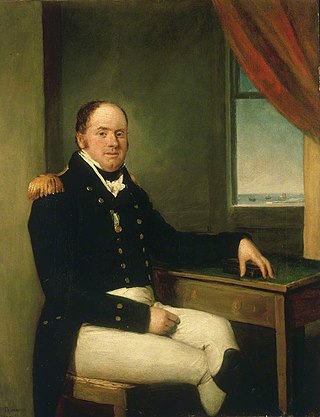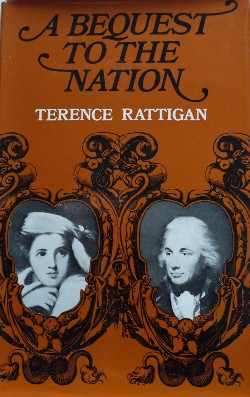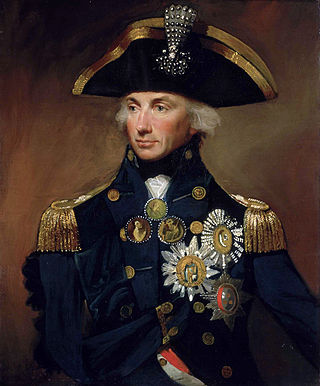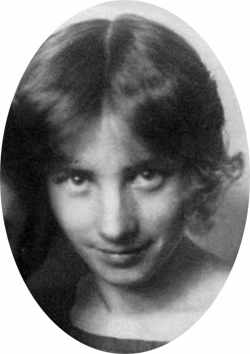Background
Berkeley began work on Nelson in 1949. In 1950 he was invited by Rear-Admiral Charles Lambe to be a guest of the Royal Navy Home Fleet on its spring cruise through the waters where the Battle of Trafalgar, Nelson's final battle, had been fought. Berkeley was provided with two grand pianos in his cabin (enabling the composer and Lambe, who was an accomplished pianist, to play duets), and the fleet slowed down between Cape St. Vincent and Cape Trafalgar to enable the composer to drink in the scene of Nelson's final moments. [1]
The opera had a partial performance, to piano accompaniment, at the Wigmore Hall in London in 1953, when the part of Nelson was sung by Peter Pears. Critics received this well, but the reviews of the full version a year later, staged at Sadler's Wells Theatre with the encouragement of Benjamin Britten, were mixed. This may have been because Britten's own The Turn of the Screw also premiered around the same time, inevitably invoking comparisons. It may also have affected critics that earlier in 1954, Berkeley's second, and very different, opera, the surrealistic comedy A Dinner Engagement , had been premiered; this successful one-act work remains the only one of Berkeley's operas to have held the stage.
Nelson had only nine performances in the 1954/5 season. In 1965 the composer wrote 'I should now want to rewrite so much of it if it were to be revived. I do think it has good things in it, but I'm not satisfied with it as a whole.' Nevertheless, a concert performance at the Queen Elizabeth Hall in 1988 evoked more positive critical consensus. [2]
The work is in the tradition of heroic opera, with typical features such as love duets, a letter scene, and large-scale finales to some of the scenes. Berkeley's style, reflecting his studies with Nadia Boulanger, also enables him to deal effectively with lighter moments of satire and comment.

Edward Benjamin Britten, Baron Britten was an English composer, conductor, and pianist. He was a central figure of 20th-century British music, with a range of works including opera, other vocal music, orchestral and chamber pieces. His best-known works include the opera Peter Grimes (1945), the War Requiem (1962) and the orchestral showpiece The Young Person's Guide to the Orchestra (1945).

Sir Peter Neville Luard Pears was an English tenor. His career was closely associated with the composer Benjamin Britten, his personal and professional partner for nearly forty years.

Dame Emma Hamilton, known upon moving to London as Emma Hart, and upon marriage as Lady Hamilton, was an English maid, model, dancer and actress. She began her career in London's demi-monde, becoming the mistress of a series of wealthy men, culminating in the naval hero Lord Nelson, and was the favourite model and muse of the portraitist George Romney.

Vice-Admiral Sir Thomas Masterman Hardy, 1st Baronet, GCB was a British Royal Navy officer. He took part in the Battle of Cape St. Vincent in February 1797, the Battle of the Nile in August 1798 and the Battle of Copenhagen in April 1801 during the French Revolutionary Wars. He served as flag captain to Admiral Lord Nelson, and commanded HMS Victory at the Battle of Trafalgar in October 1805 during the Napoleonic Wars. Nelson was shot as he paced the decks with Hardy, and as he lay dying, Nelson's famous remark of "Kiss me, Hardy" was directed at him. Hardy went on to become First Naval Lord in November 1830 and in that capacity refused to become a Member of Parliament and encouraged the introduction of steam warships.
Sir Lennox Randal Francis Berkeley CBE was an English composer.

Billy Budd, Op. 50, is an opera by Benjamin Britten to a libretto by the novelist E. M. Forster and Eric Crozier, based on the short novel Billy Budd by Herman Melville. Originally in four acts, the opera received its premiere at the Royal Opera House (ROH), London, on 1 December 1951. Britten later revised the work into a two-act opera, with a prologue and an epilogue. The revised version received its first performance at the ROH, Covent Garden, London, on 9 January 1964.

William Nelson, 1st Earl Nelson, 2nd Duke of Bronte, was an Anglican clergyman and an older brother of Horatio Nelson, 1st Viscount Nelson.
The English Opera Group was a small company of British musicians formed in 1947 by the composer Benjamin Britten for the purpose of presenting his and other, primarily British, composers' operatic works. The group later expanded to present larger-scale works, and was renamed the English Music Theatre Company. The organisation produced its last opera and ceased to run in 1980.

Merton is an ancient parish historically in Surrey, but which has since 1965 been part of Greater London. It is bounded by Wimbledon to the north, Mitcham to the east, Morden, Cheam and Cuddington to the south and (New) Malden to the west. The 1871 Ordnance Survey map records its area as 1,764.7 acres (7.1 km2).

That Hamilton Woman, also known as Lady Hamilton, is a 1941 black-and-white historical film drama produced and directed by Alexander Korda for his British company during his exile in the United States. Set during the Napoleonic Wars, the film tells the story of the rise and fall of Emma Hamilton, dance-hall girl and courtesan, who married Sir William Hamilton, British ambassador to the Kingdom of Naples, and later became Admiral Horatio Nelson's mistress.

Admiral of the Fleet Sir Charles Edward Lambe, was a senior Royal Navy officer. He fought in the Second World War in command of a cruiser, as Director of Naval Plans and then in command of an aircraft carrier. He served as First Sea Lord and Chief of the Naval Staff from 1959 until 1960 when he was forced to retire early because of a heart condition. He died only a few months later.

Horatia Nelson, christened as Horatia Nelson Thompson, was the illegitimate daughter of Emma, Lady Hamilton, and Horatio Nelson, 1st Viscount Nelson.

A Bequest to the Nation is a 1970 play by Terence Rattigan, based on his 1966 television play Nelson. It recounts the events surrounding Horatio Nelson, his mistress Emma Hamilton, and his wife Frances Nisbet in the events immediately before, during and after the Battle of Trafalgar. It also includes various other historical characters such as Thomas Hardy and William Nelson. The title refers to Nelson leaving Emma and their child Horatia to the nation on his death.
Albert Meredith Davies CBE was a British conductor, renowned for his advocacy of English music by composers such as Benjamin Britten, Frederick Delius and Ralph Vaughan Williams.

Horatio Nelson, 1st Viscount Nelson, 1st Duke of Bronté, was one of the leading British flag officers in the Royal Navy of the French Revolutionary and Napoleonic Wars, responsible for several important victories over the French and Spanish navies during a time of crisis for the country. He was widely lauded for his success, and praised for his skill and daring. After his death during the Battle of Trafalgar, he became revered as a British hero, and his fame reached new heights. Large numbers of monuments and memorials have been created in his honour, and he has continued to influence British culture and society.
Christopher John Magenis Headington was an English composer, pianist, musicologist, and music critic.

Vice-Admiral Horatio Nelson, 1st Viscount Nelson, 1st Duke of Bronte was a British flag officer in the Royal Navy. His inspirational leadership, grasp of strategy and unconventional tactics brought about a number of decisive British naval victories during the French Revolutionary and Napoleonic Wars. He is widely regarded as one of the greatest naval commanders in history. His victory on 21 October 1805 at the Battle of Trafalgar led to British naval supremacy over the next century and beyond.
Variations on an Elizabethan Theme is a set of variations for string orchestra, written collaboratively in 1952 by six English composers: Lennox Berkeley, Benjamin Britten, Arthur Oldham, Humphrey Searle, Michael Tippett and William Walton.

Bequest to the Nation is a 1973 British historical drama film directed by James Cellan Jones and starring Glenda Jackson, Peter Finch, Michael Jayston and Margaret Leighton. It is based on Terence Rattigan,s 1970 play A Bequest to the Nation.

Sophie Adele Wyss was a Swiss soprano who made her career as a concert singer and broadcaster in the UK. She was noted for her performances of French works, many of them new to Britain, for giving the world premieres of Benjamin Britten's orchestral song cycles Our Hunting Fathers (1936) and Les Illuminations (1940), and for encouraging other composers to set English and French texts. Among those who wrote for her were Lennox Berkeley, Arnold Cooke, Roberto Gerhard, Elizabeth Maconchy, Peter Racine Fricker, Alan Rawsthorne and Mátyás Seiber.














